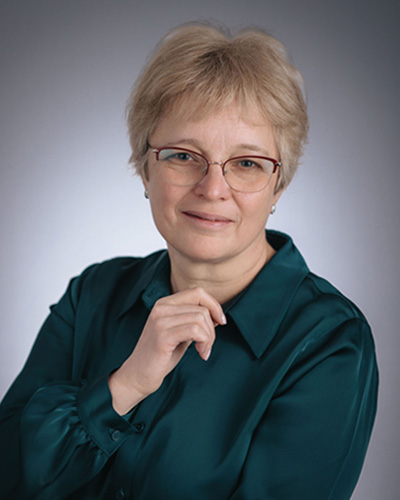Research Interests
- Action Research
- Educational Technologies
- Mathematics Education
- Modelling in STEM
- Non-Formal (Informal) Learning
- Pedagogical Approaches in STEM
- Physics Education Research
- Project-Based Instruction in STEM Education
- STEM Education Research
- Student interest and motivation in STEM
- STEM Outreach
- STEM Teacher Education
- Use of Modern Technologies in STEM Education
Title
Professor, Science Education
Education
- The University of TX at Austin, 2001, PhD, Mathematics and Science Education
- The University of TX at Austin , 1999, MA, Mathematics and Science Education
- Kharkov National University, Kharkov, Ukraine, 1991, MSc, Theoretical Physics
Biography
Dr. Marina Milner-Bolotin is a science educator within the Department of Curriculum and Pedagogy. She specializes in science (physics and mathematics) teaching and studies ways of using technology to promote student interest in STEM (science, technology, engineering and mathematics). For the last 25 years she has been teaching science and mathematics in Israel, US (Texas and New Jersey) and Canada. She has taught physics and mathematics to a wide range of students: from elementary gifted students to university undergraduates in science programs and future teachers. She also has led a number of professional development activities for science in-service and pre-service teachers and university faculty: from LoggerPro training workshops, to clicker and tablet training, and to physics content presentations at conferences and PD days. Since 1994, she has been engaged in science education research. Dr. Milner-Bolotin earned her M.Sc. in theoretical physics at Kharkov National University, Ukraine in 1991 and completed her M.A. and Ph.D. in science education at the University of Texas at Austin in 2001. At UT Austin, she investigated how project-based instruction in science courses for future elementary teachers affected their interest in science and their ability to do and teach science. Before joining UBC, she was an Assistant Professor of Physics at Ryerson University in Toronto. Dr. Milner-Bolotin was a member of the Executive Board of the American Association of Physics Teachers (AAPT, 2008-2013) and was a President and a representative for BC Section of AAPT (www.bcapt.ca). At UBC, she was promoted to an Associate Professor in May of 2015. She is actively recruiting graduate students. To learn more about Dr. Milner-Bolotin, visit her research web site at: http://blogs.ubc.ca/mmilner/ .
Invited Presentations and Keynotes
- Milner-Bolotin, M., & Milner, V. (2023, July 17). Smartphones: Bridging mathematics and science with novel technology, Psychology in Mathematics Education 46 International Conference, Haifa, Israel. https://pme46.edu.haifa.ac.il/
- Milner-Bolotin, M., & Milner, V. (2023, February 2nd). Breaking the vicious circle of physics disengagement: From undergraduate physics teaching to teacher education [Online webinar]. 81st International Scientific Conference of the University of Latvia 2023: Physics. Education, Practice. Invited seminar for University Physics Education Practitioners, Riga, Latvia.
- Martinovic, D., & Milner-Bolotin, M. (2022, August 15). Mathematical Modelling and its STEM Applications [Online webinar]. Mathematical leadership PD session – Mathematical modelling: In conversation with a physics and a mathematics educators, Toronto. http://mkn-rcm.ca/mkn/mathematics-leadership-pd-session-mathematical-modelling-in-conversation-with-a-physics-and-a-mathematics-educator-august-15/
- Milner-Bolotin, M., & Milner, V. (2021). A physics lab in your pocket: Physics Olympics go online LUMAT Research Symposium 2021, Invited presentation, Helsinki, Finland.
- Milner-Bolotin, M. (2021, 12-08). 21st Century STEM Education: Developing & implementing innovative research-based curricula, Northeast Normal University, China, Changchun, China.
- Milner-Bolotin, M., & Martinovic, D. (2021, March 19-20). Exploring multidisciplinarity in STEM teacher education through modelling, International conference: Roadmap for Humanities & Social Sciences in STEM Higher Education, IIT Jammu.
- Milner-Bolotin, M. (November, 18, 2021). Teacher Education in Canada – International Online Seminar: Teacher Education in XXI Century: New challenges and Solutions, Minsk, Republic of Belarus.
- Milner-Bolotin, M. (2021, November 5, 2021), Smartphones, Social Media, & STEAM: A new look at engagement of 21st century students, 11th EdukCircle International Convention on Education Studies, The Philippines.
- Milner-Bolotin, M. (2021, June 8). Educational silver lining of the pandemic: Looking forward, Glancing back, Public Sector Network’s: Digital Government & CX, Toronto, Canada. https://publicsectornetwork.co/wp-content/uploads/2020/07/PSN-Virtual-2021-EduTech-Canada.pdf
- Milner-Bolotin, M. (2020, 06-03-2020). The STEAM silver lining of the pandemic: Implications for teacher education International, LUMAT Research Symposium 2020, Helsinki Finland. https://www.luma.fi/en/lumat-2020/.
- Milner-Bolotin, M., Tsybulsky, D., & Chachashvili-Bolotin, S. (2019). Breaking the boundaries: From innovation to practice in STEM teacher education, 16th Jerusalem Conference in Canadian Studies, Jerusalem, Israel.
- Milner-Bolotin, M. (2017). Developing deliberate pedagogical thinking with online collaborative tools in STEM teacher education. Jerusalem, Israel: Hebrew University of Jerusalem, Israel; Weizmann Institute of Science, Rehovot, Israel.
- Milner-Bolotin, M., (2015, April 11-14), Using PeerWise online collaborative tool to improve physics teacher-candidates’ questioning skills, National Association of Research in Science Teaching (NARST) International Annual Conference, Chicago, IL.
- Milner-Bolotin, M. (2015, March 23). Technology transforming STEM education: Are we there yet? Aarhus University, STEM Education Center, Aarhus University, Denmark.
- Milner-Bolotin, M. (2015, January 5). Re-imagining best practices in technology-enhanced physics teacher education. Annual Winter Meeting of the American Association of Physics Teachers, San Diego, California.
- Milner-Bolotin, M. (2014, November 21-22, 2014). Closing the research-practice gap through innovative technology use in STEM teacher education. Plenary speaker at the Fifth GeoGebra North American Conference(GeoGebra-NA 2014): Explorative Learning with Technology, Ontario Institute for the Studies in Education, Toronto, ON.
- Milner-Bolotin, M. (2014, August 7). An invited member of the Women in Science Panel: Dual career families. 5th International Conference on Women in Physics/International Union of Pure and Applied Physics, Waterloo, ON, Canada.
- Milner-Bolotin, M. (2014, February 16). Using educational technologies to promote inquiry and the nature of science in physics teacher education. Korean Association for Science Education International Conference, Daegu University at Gyeongsan, Gyeongbuk, Republic of Korea.
- Milner-Bolotin, M. (2012). Physics teacher preparation in Canada: Challenges and successes. American Association of Physics Teachers Winter Meeting, Ontario, California.
- Milner-Bolotin, M. (2012, March 15). Teachers’ playground: Enhancing science learning through effective technology implementation. Ruppin Academic Center, Israel.
- Milner-Bolotin, M. (2012, March 14). Beyond the paradigm: Implications of Kuhn’s “Structure” on educational research and teacher education. Department of Science Education, Hebrew University of Jerusalem. Jerusalem, Israel.
- Naslund, J., Levine, S., & Milner-Bolotin, M. (2012). Celebrate science: Bridging science educators, science writers and librarians in order to promote science learning in British Columbia. American Association for the Advancement of Science, Vancouver, BC.
- Milner-Bolotin, M. (2011, January 5). American Association of Physics Teachers, Committee on the Women in Physics. Presenter on the Panel: “State of Women in Physics”. Jacksonville, FL.
- Milner-Bolotin, M. (2011). Brief Introduction to Video-Based Motion Analysis: Physics Teachers’ Perspective. Invited paper presented at the Annual Meeting of the BC Association of Physics Teachers, Kelowna, BC.
- Milner-Bolotin, M. (2011). A science adventure of a girl who wanted to be a physicist. Paper presented at the International Conference for Women in Physics, Cape Town, South Africa, April 5-9, 2011.
- Milner-Bolotin, M. (2011). Brief Introduction to Video-Based Motion Analysis: Physics Teachers’ Perspective. Paper presented at the Annual Meeting of the BC Association of Physics Teachers, Kelowna, BC.
- Milner-Bolotin, M. (2011). A science adventure of a girl who wanted to be a physicist. Paper presented at the International Conference for Women in Physics, Cape Town, South Africa, April 5-9, 2011.
Selected Recent Publications (Since 2015):
Peer-reviewed Journal Publications
- Milner-Bolotin, M., & Martinovic, D. (2024). Creative approaches for 21st-century Science, Technology, Engineering, and Mathematics teacher education: From theory to practice to policy. Future in Education Research. https://onlinelibrary.wiley.com/doi/10.1002/fer3.70
- Zhang, B., Ren, H., & Milner-Bolotin, M. (2024). Science Outreach Activities: Practice · Experience · Cooperation – Take UBC Physics Olympics as an example; 科学拓展活动:实践·体验·合作 ——以UBC物理奥林匹克活动为例. Physics Teacher (China), 43(11), 90-96. https://physicsteacher.suda.edu.cn/CN/Y2024/V45/I11/90
- Tembrevilla, G., & Milner-Bolotin, M. (2024). Expanding Teacher’s technological, pedagogical, and content knowledge with funds of knowledge: An exploratory STEM professional development model using video creation workshops. Future in Educational Research, 1-19. https://doi.org/https://doi.org/10.1002/fer3.67
- Liu, Y., Maltais, N., Milner-Bolotin, M., & Chachashvili-Bolotin, S. (2024). Investigating Adolescent Psychological Well-being Using PISA 2018 Canada Data. Frontiers, 15. https://doi.org/10.3389/fpsyg.2024.1416631
- Lee, C., Meyers, E., & Milner-Bolotin, M. (2024). Science Learning in YouTube Comments on Science Videos Embedding Movie References. Journal of College Science Teaching, February, 2024, 1-7. https://doi.org/https://doi.org/10.1080/0047231X.2024.2389439
- Milner-Bolotin, M. & Zazkis, R. (2024). Unleashing creativity in STEM teacher education through scripting task pedagogy. Future in Education Research, 2(3), 1-15. https://doi.org/https://doi.org/10.1002/fer3.52
- Milner-Bolotin, M. & Milner, V. (2024). Increasing student science, technology, engineering and mathematics engagement through phyphox activities: Three practical examples. Future in Education Research, 2(3), 1-16. https://doi.org/https://doi.org/10.1002/fer3.50
- Martinovic, D., & Milner-Bolotin, M. (2024). Re-imagining Professional Learning Communities in Education: Placing Teacher Leadership in STEM Context. School Science and Mathematics, 1-12. https://doi.org/10.1111/ssm.18315
- Toma, M. J., Tembrevilla, G., & Milner-Bolotin, M. (2024). Investigating pedagogical opportunities of educational technologies in developing countries: Physics Education Technology workshops for Bangladeshi science, technology, engineering and mathematics teachers. Future in Education Research, 2(3), 1-19. https://doi.org/https://doi.org/10.1002/fer3.51
- Saville, E., Milner-Bolotin, M., & Anderson, D. (2024). Empowering Teachers through an Online Asynchronous Science Education Cohort Graduate Program. Journal of Science Teacher Education, Submitted November, 2023, 19. https://doi.org/10.1080/1046560X.2024.2404798
- Santos, R., Anderson, D., & Milner-Bolotin, M. (2022). “Research trends in international STEM education conference series: An analysis of a decade of proceedings”. Frontiers in Education: STEM Education, 7, 17. https://doi.org/10.3389/feduc.2022.1099658(January 23, 2023)
- Liu, Y., Odic, D., Tang, X., Ma, A., Laricheva, M., Chen, G., Wu, S., Niu, M., Guo, Y., & Milner-Bolotin, M. (2023). “Effects of Robotics Education on Young Children’s Cognitive Development: A Pilot Study with Eye-Tracking “. Journal of Science Education and Technology. https://doi.org/10.1007/s10956-023-10028-1
- Milner-Bolotin, M. (2022). 让科学影响每一个人 (Make science influence everyone). 中国科技教育 (China Science Technology Education), 2021(01), 8-10. https://doi.org/https://mp.weixin.qq.com/s/TZxRp1XKW25DYNUDE3bmxg
- Yuan, Z.-Q., Milner-Bolotin, M., & Anderson, D. (2021). “Lessons Learned from Educating STEM Teachers in Canadian Universities: The Case of the University of British Columbia.” Journal of Mathematics Education, 30(6), 96-102.
- Milner-Bolotin, M., & Zazkis, R. (2021). “A study of future physics teachers’ knowledge for teaching: A case of a decibel sound level scale”. LUMAT: International Journal on Math, Science and Technology Education, 9(1), 336-365. https://doi.org/10.31129/LUMAT.9.1.1519
- Martinovic, D., & Milner-Bolotin, M. (2021). “Examination of modelling in K-12 STEM teacher education: Connecting theory with practice”. STEM Education, 1(4), 279-298. https://doi.org/https://doi.org/10.3934/steme.2021018
- Herranen, J. K., Fooladi, E. C., & Milner-Bolotin, M. (2021). Editorial: Special Issue “Promoting STEAM in Education”. LUMAT: International Journal of Math, Science and Technology Education, 9(9), 1-8. https://doi.org/https://doi.org/10.31129/LUMAT.9.2.1559
- Yuan, Z.-Q., & Milner-Bolotin, M. (2020). “A Study of a TPACK-based Subject-Specific Educational Technology Course and Its Implications ——The Case of “Teaching Mathematics and Science through Technology” Course at The University of British Columbia” [A Study of a TPACK-based Subject-Specific Educational Technology Course and Its Implications ——The Case of “Teaching Mathematics and Science through Technology” Course at The University of British Columbia]. Journal of Mathematics Education, 29(1), 23-29. https://mp.weixin.qq.com/s/KUIR9wvqvBldKM9A-nqf2Q
- Yuan, Z.-Q., Anderson, D., & Milner-Bolotin, M. (2020). “Breaking down the walls of the classroom to promote STEM teacher professional development: A dialogue with Canadian scholars”. Research and Review on Education, 6, 40-47. https://mp.weixin.qq.com/s/hAdk4LMqRsIZlkuqdo9ywg.
- Milner-Bolotin, M., Aminov, O., Wasserman, W., & Milner, V. (2020). “Pushing the boundaries of science demonstrations using modern technology”. Canadian Journal of Physics, 98(6), 571-578. https://doi.org/https://doi.org/10.1139/cjp-2019-0423
- Tembrevilla, G., & Milner-Bolotin, M. (2019). “Engaging physics teacher-candidates in the production of science demonstration videos”. Physics education, 54(2), 025008-025018. http://stacks.iop.org/0031-9120/54/i=2/a=025008
- Packer, C., Martinovic, D., Kolikant, Y. B.-D., Milner-Bolotin, M., Parattukudi, A., Petersen, R. K. B., Mower, D., Valand, I. U., Bjørkkjær, T., Oladipo, A. J., Osokoya, M., Udeani, U., & Kasch, H. (2019). “Participant-centered adjunct faculty development: A case study using the Great Teachers Model”. Journal of the International Society for Teacher Education, 23(2), 6-20.
- Milner-Bolotin, M., Liao, T., & McKenna, J. (2019). “UBC Physics Olympics: Forty-one years of province-wide physics outreach “. International Newsletter on Physics Education: International Commission on Physics Education – International Union of Pure and Applied Physics, 70 (November), 5-6. https://us20.campaign-archive.com/?u=173cff9755457424d7b6da150&id=ca7a3ba119&fbclid=IwAR3bfP9VIgSr97YXfhAi3zOxvSbH_qgjQNO84YNCSGwAb3TNbTXP-4COa34
- Chachashvili-Bolotin, S., Lissitsa, S., & Milner-Bolotin, M. (2019). “STEM outcomes of second-generation immigrant students with high-skilled parental backgrounds”. International Journal of Science Education, 41(17), 2465-2483. https://doi.org/10.1080/09500693.2019.1686549.
- Milner-Bolotin, M. (2018). “Promoting reflective physics teaching through the Use of Collaborative Learning Annotation System”. The Physics Teacher, 56(May), 313-316.
- Milner-Bolotin, M., & Marotto, C. (2018). “Examination of parental engagement in children’s STEM education. Part I: Meta-analysis of the Literature”. LUMAT: Research and Practice in Math, Science and Technology Education, Accepted March 2018.
- Marotto, C., & Milner-Bolotin, M. (2018). “Examination of parental engagement in children’s STEM education. Part II: Parental views on promoting children’s STEM education In- and Out-of-School”. LUMAT: Research and Practice in Math, Science and Technology Education, Accepted March 2018.
- Milner-Bolotin, M., & Milner, V. (2017). “Family Mathematics and Science Day at UBC Faculty of Education”. Physics in Canada, 73(3), 2.
- Liao, T., McKenna, J., & Milner-Bolotin, M. (2017). “Four decades of High School Physics Olympics Competitions at the University of British Columbia”, Physics in Canada, 73(3), 3.
- Milner-Bolotin, M. (2016). “Rethinking Technology-Enhanced Physics Teacher Education: From Theory to Practice”. Canadian Journal of Science, Mathematics and Technology Education, 16(3), 284-295.
- Milner-Bolotin, M. (2015). Visual literacy skills in STEM education. In M. J. Spector (Ed.), the SAGE Encyclopedia of Educational Technology. V. 2, 825-829. ISBN: 9781452258225.
- Milner-Bolotin, M. (2015). “Learning physics teaching through collaborative design of conceptual multiple-choice questions”. The Canadian Journal of Action Research, 16(2)), 22-41.
- Milner-Bolotin, M. (2015). “Increasing girls’ participation in physics: Education research implications for practice”. Physics in Canada, 71(2), 94-97.
Textbooks
- Hawkes, Robert, Iqbal, Javed, Mansour, Firas, Milner-Bolotin, Marina, & Williams, Peter. (2018). “Physics for scientists and engineers: An interactive approach”. 2nd Edition. Toronto: Nelson Education.
Edited Books and Book chapters
- Milner-Bolotin, M., & Milner, V. (2023). “Smartphone applications as a catalyst for active learning in chemistry: Investigating the Ideal Gas Law “. In Y. J. Dori, C. Ngai, & G. Szteinberg (Eds.), Digital Learning and Teaching in Chemistry (pp. 266-280). Royal Society of Chemistry. https://books.rsc.org/books/edited-volume/2075/Digital-Learning-and-Teaching-in-Chemistry.
- Milner-Bolotin, M., & Milner, V. (2023). “Breaking the Vicious Circle of Secondary Science Education with Twenty-First-Century Technology: Smartphone Physics Labs “. In G. P. Thomas & H. J. Boon (Eds.), Challenges in Science Education: Global Perspectives for the Future (pp. 177-199). Springer International Publishing. https://doi.org/10.1007/978-3-031-18092-7_9
- Tembrevilla, G., & Milner-Bolotin, M. (2024). Reimagining micro-teaching through collaborative technology implementation: Supporting preservice STEM teachers as reflective practitioners. In J. Pattison-Meek & C. Phillips (Eds.), Pedagogies of Practicum – Post-Pandemic Reflections on Innovation in Practice Teaching (pp. 267-286). Peter Lang International Academic Publishing Group. https://doi.org/10.3726/b22164
- Martinovic, D., & Milner-Bolotin, M. (2022). “Problematizing STEM: What it is, what it is not, and why it matters”. In C. Michelsen, A. Beckmann, V. Freiman, U. Thomas Jankvist, & A. Savard (Eds.), 15 Years of MACAS (Mathematics and its Connections to the Arts and Sciences) (pp. 135-162). Springer Nature. https://doi.org/https://link.springer.com/chapter/10.1007/978-3-031-10518-0_8
- Ben-David Kolikant, Y., Martinovic, D., & Milner-Bolotin, M. (Eds.). (2020). “STEM Teachers and Teaching in the Digital Era: Professional expectations and advancement in 21st Century Schools”. Springer. https://doi.org/https://doi.org/10.1007/978-3-030-29396-3.
- Ben-David Kolikant, Y., Martinovic, D., & Milner-Bolotin, M. (2020). “Introduction: STEM teachers and teaching in the era of change”. In Y. Ben-David Kolikant, D. Martinovic, & M. Milner-Bolotin (Eds.), STEM Teachers and Teaching in the Digital Era: Professional expectations and advancement in 21st Century Schools (pp. 1-18). Springer. https://doi.org/https://doi.org/10.1007/978-3-030-29396-3
- Milner-Bolotin, M. (2015). “STEM teacher-candidates’ engagement with technology: Challenges and possibilities”. In X. Ge, D. Ifenhaler & J. M. Spector (Eds.), Emerging technologies for STEAM Education (pp. 135-53): Springer, Switzerland.
- Milner-Bolotin, M. (2019). “Technology as a catalyst for 21st century STEM teacher education”. In S. Yu, H. M. Niemi, & J. Mason (Eds.), Shaping Future Schools with Digital Technology: An International Handbook (pp. 179-199). Springer. https://www.springer.com/gp/book/9789811394386.
- Tsybulsky, D., Milner-Bolotin, M., & Chachashvili-Bolotin, S. (2018). “STEM or S.T.E.M.? Challenging a traditional paradigm through Innovative Three Step Approach to STEM teacher education.“ In L. G. Chova, A. L. Martínez, & I. C. Torres (Eds.), ICERI-2018: 11th annual International Conference of Education, Research and Innovation (pp. 4664-4672). IATED. https://doi.org/https://iated.org/iceri/.
- Milner-Bolotin, M. (2017). “Technology-supported inquiry in STEM teacher education: Collaboration, challenges and possibilities “. In I. Levin & D. Tsybulsky (Eds.), Digital Tools and Solutions for Inquiry-Based STEM Learning (Vol. 1, pp. 252-281). Hershey, PA: IGI Global.
- Milner-Bolotin, M. (2017). “Nurturing creativity in future mathematics teachers through embracing technology and failure”. In V. Freiman, J. Tassell, & D. Martinovic (Eds.), Creativity and Technology in Math Education (pp. 22). Switzerland: Springer.
- Milner-Bolotin, M. (2016). “Promoting Deliberate Pedagogical Thinking with Technology in physics teacher education: A teacher-educator’s journey”. In K. MacLeod and T. G. Ryan (Eds.), The Physics Educator: Tacit Praxes and Untold Stories. (25 p.), Champagne, IL, USA: Common Ground.
Conference Proceedings
- Milner-Bolotin, M., Anderson, D., & Elizabeth, S. (2024, August 1). Online graduate program as a catalyst for science teachers’ pedagogical transformation: From new technologies to novel pedagogies ISSE 2024: 8th International STEM in Education Conference, Calgary, AB, Canada.
- Tembrevilla, G., Toma, M. J., & Milner-Bolotin, M. (2024, June 23-26). Enhancing STEM education: Integrating collaborative technologies in micro-teaching for preservice teachers. American Society for Engineering Education Annual Conference, Portland, OR.
- Milner-Bolotin, M., Nicol, C., Anderson, D., Noori, S., Toma, M. J., Martinovic, D., Tembrevilla, G., Radzimski, V., Moll, R., Lee, C. M., McIntosh, L., & Hodge, K. (2024, August 1). Province-wide STEM network: Outreach collaboration across British Columbia ISSE 2024: 8th International STEM in Education Conference, Calgary, AB, Canada.
- Saville, E. M., Anderson, D., & Milner-Bolotin, M. (2024, March 17-20). Empowering Science Teachers’ Pedagogical Transformation through Participation in an Online Asynchronous Graduate Program 2024 Annual International Conference of the National Association of Research in Science Teaching, Denver, CO. https://narst.org/conferences/2024-annual-conference
- Tembrevilla, G., Toma, M. J., & Milner-Bolotin, M. (2024, June 23-26). Enhancing STEM education: Integrating collaborative technologies in micro-teaching for preservice teachers. American Society for Engineering Education Annual Conference, Portland, OR.
- Lucz, I. T. T., & Milner-Bolotin, M. (2022). “Video making as a powerful tool in physics teacher education and in teaching and learning”. Journal of Physics: Conference Series, 2297, 012026. https://doi.org/10.1088/1742-6596/2297/1/012026
- Anderson, D., Milner-Bolotin, M., Santos, R., & Petrina, S. (Eds.). (2021). “Proceedings of the 6th International STEM in Education Conference (STEM 2021) [Conference Proceedings]”. University of British Columbia. https://stem2021.ubc.ca/. https://www.cnstedu.cn/index/article/article_list.html?ar_id=3421
- Milner-Bolotin, M., Milner, V., Tasnadi, A. M., Weck, H. T., Gromas, I., & Ispanovity, P. D. (2021). “Contemporary experiments and new devices in physics classrooms”. GIREP – Physics Education Conference 2019 Proceedings. http://fiztan.phd.elte.hu/english/student/devices.pdf
Selected Earlier Publications (prior to 2015)
- Milner-Bolotin, M. (2014). “Making online graduate teacher education courses matter – from theory to successful technology-enhanced practice”. In T. G. Ryan & D. C. Young (Eds.), Teaching Online: Stories from Within (pp. 10-31). Champaign, IL, USA: Common Ground.
- Hawkes, Robert, Iqbal, Javed, Mansour, Firas, Milner-Bolotin, Marina, & Williams, Peter. (2014). “Physics for scientists and engineers: An interactive approach”. Toronto: Nelson Education.
- Ahmed, N. S., Gerase, M., D’Agostino, S., Stortz, G., Hawkes, R., Iqbal, J., Milner-Bolotin, M, Mansour, F., Williams, P. (2014). “Student solutions manual for use with Physics for Scientists and Engineers: An interactive approach”. Toronto: Nelson Education.
- Milner-Bolotin, M. (2014). “Using PeerWise to promote student collaboration on design of conceptual multiple-choice questions”. Physics in Canada, 70(3), 149-150.
- Milner-Bolotin, M. (2014). “Promoting research-based physics teacher education in Canada: Building bridges between theory and practice”. Physics in Canada, 70(2), 99-101.
- Milner-Bolotin, M., Fisher, Heather, & MacDonald, Alexandra. (2013). “Modeling active engagement pedagogy through classroom response systems in a physics teacher education course”. LUMAT: Research and Practice in Mathematics, Science and Technology Education, 1(5), 525-544.
- Milner-Bolotin, M. (2012). “Increasing interactivity and authenticity of chemistry instruction through data acquisition systems and other technologies”. Journal of Chemical Education,89(4), 477-481.
- Milner-Bolotin, M., & Nashon, S. (2012). “The essence of student visual–spatial literacy and higher order thinking skills in undergraduate biology”. Protoplasma,249(1), 25-30.
- Milner-Bolotin, M. (2012). “Water pearls optics challenges for everybody”. The Physics Teacher, 50(1), 144-145.
- Milner-Bolotin, M. (2012). “Growing water pearls: Exciting physical science activities on a shoestring budget”. The Science Teacher, 79 (Summer), 38-42.
- Milner-Bolotin, M. (2011). “Science outreach to elementary schools: What the physics community can do to make a difference”. Physics in Canada, 67(3 (July-Sept.)), 174-176.
- Milner-Bolotin, M, Antimirova, T., Noack, A., & Petrov, A. (2011). “Attitudes about science and conceptual physics learning in university introductory physics courses”. Physical Review Special Topics – Physics Education Research, 7, 020107-020109.
- Thompson, R., & Milner-Bolotin, M. (2010). “Interview with Marina Milner-Bolotin”, June 2010. Physics in Canada, 66(3), 207-212, interview.
- Milner-Bolotin, M. (2010). “Reflections on Teaching an Advanced Graduate Online Course in Educational Technology: Challenges and Successes”. Ubiquitous Learning an International Journal, 2 (1), p. 1-16.
- Milner-Bolotin, M. (2010). “Trends in Science Education Today: The Canadian Science Education Landscape”. In D. A. Cancilla & S. P. Albon (Eds.), Moving the Laboratory Online: Situating the Online Laboratory Learning Experience for Future Success: Alfred P. Sloan Foundation.
- Milner-Bolotin, M., & Antimirova, T. (July 2010). “Multipurpose Mobile HP Lab for Science and Engineering Students”. Published in the Proceedings of the EDULEARN10, Barcelona, Spain.
- Antimirova, T. & Milner-Bolotin. (July 2010). “Video Analysis in Science and Engineering Education”. Published in the Proceedings of the EDULEARN10, Barcelona, Spain.
- Milner-Bolotin, M., Antimirova, T., & Petrov, A. (2010). “Clickers beyond the First Year Science Classroom”. Journal of College Science Teaching, 40(2), 18-22.
- Kalman, C. S., Milner-Bolotin, M., & Antimirova, T. (2010). “Comparison of the effectiveness of collaborative groups and peer instruction in a large introductory physics course for science majors”. Canadian Journal of Physics, 88(5), 325-332.
- Milner-Bolotin, M., (2007), “Reflections on the University of British Columbia Faculty Teaching Certificate Program”, International Journal of the Scholarship of Teaching and Learning, 1, Number 2, July 2007, (Hhttp://www.georgiasouthern.edu/ijsotl/current.htmH).
- Milner-Bolotin, M., Kotlicki A., Rieger G, (2007) “Can Students Learn from Lecture Demonstrations? The Role and Place of Interactive Lecture Experiments in Large Introductory Science Courses”, The Journal of College Science Teaching, 37, Jan.-Feb, p.45-49.
- Milner-Bolotin, M., (2007) “Building Bridges between the Scientists and the Teachers to Bring the Joy of Science to British Columbia Students”, (30), Number 9, (Summer 2007), The Science Scope, National Science Teachers Association, p. 58-59.
- Marina Milner-Bolotin, (2007), “Teachers as Actors: The Implications of Acting on Physics Teaching”, The Physics Teacher, 45, Issue 10, October 2007, p. 58-60.
Research Projects
1. Examination educational technology (e.g., smartphones, personal devices) as a tool for engaging future and practising STEM teachers.
2. Educating pre-service and in-service teachers for meaningful engagement in and with STEM Education.
3. Exploring the role of modelling to develop mathematical thinking in STEM education.
4. Engaging gifted and talented students with STEM.
4. Exploring the effects of science outreach on elementary and secondary teachers and students.
Courses Taught
Undergraduate Courses (since 2010 – present):
EDCP 349 – Science Education Methods course for Elementary teacher-candidates in a Problem-Based cohort (completely re-designed a course).
EDCP 349 – Science Education Methods for Elementary teachers for Middle Years Cohort (completely re-designed a course).
EDCP 352 – Science Education Methods course for Secondary science teacher-candidates.
EDCP 357 – Physics Methods course for secondary physics teacher-candidates (completely re-designed a course).
EDUC 450 – Inquiry I course for secondary mathematics and science teacher-candidates.
EDUC 451 – Inquiry II course for secondary mathematics and science teacher-candidates.
Graduate Courses (since 2010 – present):
EDCP 544 – Mathematics and Science Teaching and Learning with Technologies – a graduate course for online M.Ed. in Science Education Cohorts.
EDCP 585A/B – Teaching Science and Mathematics through Technology – special graduate course (designed a new graduate course).
ETEC 533 – Technology in Mathematics and Science Classroom – a graduate course in the Masters in Educational Technology Program (redesigned an online graduate course).
EDCP 559 – Research in the Teaching and Learning of the Sciences (designed a new graduate course).
Research Methods – a special Graduate course for the students from Hangzhou University, China.
Students Supervised
I supervised (including co-supervision) the following graduate students at the Department of Curriculum and Pedagogy:
Graduate Students
PhD Students
Mohosina Jabin Toma | In progress
Meghan Allen | In progress
Gerald Tembrevilla | Examining ICT and FoK Integration in Rural Public Junior High Schools with the Philippine’s New K-12 Curriculum: A case study / 2020
Anka Lekhi | International Students’ Epistemologies and Learning Experiences in Specially Designed First-Year Chemistry Courses / 2018
Ashley Welsh | Investigating Undergraduate Students’ Metacognitive Transformations in an Introductory Organic Chemistry Course / 2015
MA Students
- Serene Francis Rodrigues: In progress
- Suresh Ghimire: In progress
- Shahidul Islam: In progress
- Mohosina Jabin Toma: Completed July 2023
- Conan Lee: Completed June 2023
- Carlos Marotto: Graduated July 2018
- Colin Mayer: Graduated November 2016
- Norah Al-Ghamdi: Graduated August 2016
- Rachael Bates: Graduated November, 2015
- Diane Gillis DeSequera: Graduated August 2015
- Heather Fisher: Graduated August 2014
- Alexandra McDonald: Graduated August 2014
- Romy Friedman: Graduated August 2012
- Ashley Welsh: Graduated August 2011
MEd Students
- Bonnie Zhang: In progress
- Caitlin Nelson: Graduated August 2022
- Eric Zhang: Graduated August 2022
- Noel Abraham: Graduated August 2022
- Sharon Nijjar: Graduated August 2018
- Zaid Salem: Graduated August 2018
- Solmaz Khodaeifaal: Graduated August 2018
- Davor Egersdorfer: Graduated August 2015
- Murugan Vineyagam: Graduated August 2015
- Christina Mikelsons: Graduated August 2014
- Thomas Christopher Jacoby: Graduated April 2014
- Tom Salzmann: Graduated August 2014
- Xue Qi: Graduated August 2014
- David Riendl: Graduated August 2014
- Clare Muirhead: Graduated August 2013
- Evan Hall: Graduated December 2014
- Darryl Dietrich: Graduated August 2013
- Lucy How: Graduated August 2011
MEd Students Co-supervised with Prof. David Anderson
M.Ed. in Science Education Cohort 3 (In progress)
- Linda Au: Expected graduation August 2024
- Tessa Bartlett: Expected graduation August 2024
- Raynda Brands: Expected graduation August 2024
- Nicole Furutani: Expected graduation August 2024
- Christina Gerk: Expected graduation August 2024
- Jimmy Gunka: Expected graduation August 2024
- Kelsey Jefferson: Expected graduation August 2024
- Rebecca Kaye: Expected graduation August 2024
- Edward Liao: Expected graduation August 2024
- Justin Logan-Chesney: Expected graduation August 2024
- Emily Marsh: Expected graduation August 2024
- Andrew Mathie: Expected graduation August 2024
- Christine Matus: Expected graduation August 2024
- Kelly O’Brien: Expected graduation August 2024
- Jeffrey O’Keefe: Expected graduation August 2024
- Martin Pagcaliwagan: Expected graduation August 2024
- Hannah Rudson: Expected graduation August 2024
- Andrew Shires: Expected graduation August 2024
- Daniel Van Walleghem: Expected graduation August 2024
- Erin Warkman: Expected graduation August 2024
- Christina Watkins: Expected graduation August 2024
- Stephen Wellsby: Expected graduation August 2024
- Kimberley Wilkinson: Expected graduation August 2024
M.Ed. in Science Education Cohort 2 (2020-2022)
- Heather Amadori: Graduated August 2022
- Amanda Buchan: Graduated August 2022
- Priscila Chan: Graduated August 2022
- Kevin Dimmick: Graduated August 2022
- Steve Domcol: Graduated August 2022
- Brad Farrell: Graduated August 2022
- Katie Fikkert: Graduated August 2022
- Lauren Grey: Graduated August 2022
- Trevor Heard: Graduated August 2022
- Parveet Hundal: Graduated August 2022
- Jessica Jones: Graduated August 2022
- Tim Kwok: Graduated August 2022
- Jeff Lee: Graduated August 2022
- Emerik Mehes: Graduated August 2022
- Karycia Mitchell: Graduated August 2022
- Amy Nickel: Graduated August 2022
- Bridget O’Miley: Graduated August 2022
- Amrita Ollek: Graduated August 2022
- Wesley Schmitt: Graduated August 2022
- Paul Siu: Graduated August 2022
- Sukhjit Sukhi: Graduated August 2022
- Brandy Turner: Graduated August 2022
M.Ed. in Science Education Cohort 1 (2018-2022)
- Heather Amadori: Graduated August 2022
- Victoria Larson: Graduated August 2020
- Heather Lessard: Graduated August 2020
- Gregory Muirhead: Graduated August 2020
- Christina Drescher: Graduated August 2020
- Monika Gundasa: Graduated August 2020
- Danielle Klassen: Graduated August 2020
- Jeff Green: Graduated August 2020
- David R. Knight, III: Graduated August 2020
- Corey Cheng: Graduated August 2020
- Laura Gorjao: Graduated August 2020
- Amy Jamieson: Graduated August 2020
- Denis Van Dalen: Graduated August 2020
- Jennifer Doll: Graduated August 2020
- David Burnham: Graduated August 2020
- Nathalie Cielanga: Graduated August 2020
- James McIean: Graduated August 2020
- Lisa Ramnish: Graduated August 2020
- Tania Toth: Graduated August 2020
- Dahinda Trusty: Graduated August 2020





